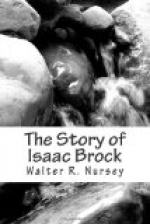The soldier awoke.
“This is the first time,” he shouted, “I have ever seen the 49th turn their backs! Surely the heroes of Egmont will never tarnish their record!”
* * * * *
The rebuke stung. The panting ranks closed up.
[Illustration: DEATH OF ISAAC BROCK]
CHAPTER XXX.
THE DEATH OF ISAAC BROCK.
At this moment Colonel Macdonell, excited and eager to participate, reached the foot of the mountain at the head of the supports for which the General had despatched him. These consisted of about thirty of Heward’s flank company of militia and thirty of the 49th—almost breathless and much exhausted, having run most of the way. Brock’s small force—those actually at his side—were Chisholm’s and Cameron’s companies of the Toronto and York volunteers—a mere handful of perhaps eighty all told. These, together with Macdonell’s men, who were at the foot of the hill on the right, now numbered less than 190 of all ranks.
For an instant there was a pause. Brock spoke hurriedly to his aide.
“If Williams and Macdonell can but outflank the Americans on the summit and scale the mountain in rear of the redan on the right, nothing can prevent our driving them out. Our place is here.”
“But, General,” interposed his aide, who worshipped his commanding officer, “I pray you, let me lead, or at least do take proper precautions. If you are wounded, think what may befall us.”
“Master Glegg,” hurriedly replied Brock, “I must remain at the head of these men. Duty and desire compel me. Should I fall, there are others not less competent.”
A half smile, a touch of the arm, and the two men separated. A long separation.
* * * * *
Deceived by the scarlet uniforms of the militia flank companies, Wool believed that the attacking party was composed exclusively of regulars, so steady was their advance. His own force now consisted of 500 men, over 300 of whom were regulars. Notwithstanding his much greater strength and vastly superior position, being protected by artificial brush-shelters and logs, and the withering fire with which he met the dogged progress of the British, his flanks, pressed by Williams and Macdonell, began to shrink. The moment was a critical one for our hero.
The supreme effort must be made.
Glancing below, Brock, even at that instant, for a fleeting moment was conscious of the beauty of the country spread beneath him. Almost as far as eye could reach extended an immense, partly pastoral plain, studded with villages, groves, winding streams, cultivated farms, orchards, vineyards and meadows. In places a dense forest, decorated with autumn’s mellow tints, and furrowed by the black gorge of the Niagara, stretched to the horizon. Across all, shadows of racing clouds gave emphasis to the brilliant flood of sunshine. No fairer scene ever greeted the eye of man. The entire landscape breathed peace. Above it, however, in detached masses, hung lurid billows—the smoke of battle.... The serene vision faded, and in its place, in brutal contrast, came cruel, imperious bugle calls, the metallic rattle of fire-arms, the deep thunder of artillery, the curdling cry of wounded men.




